#daughter of ludwig i of bavaria
Explore tagged Tumblr posts
Text
“She is unfit for her position both as Empress and as wife”: Elisabeth and Dr. Seeburger

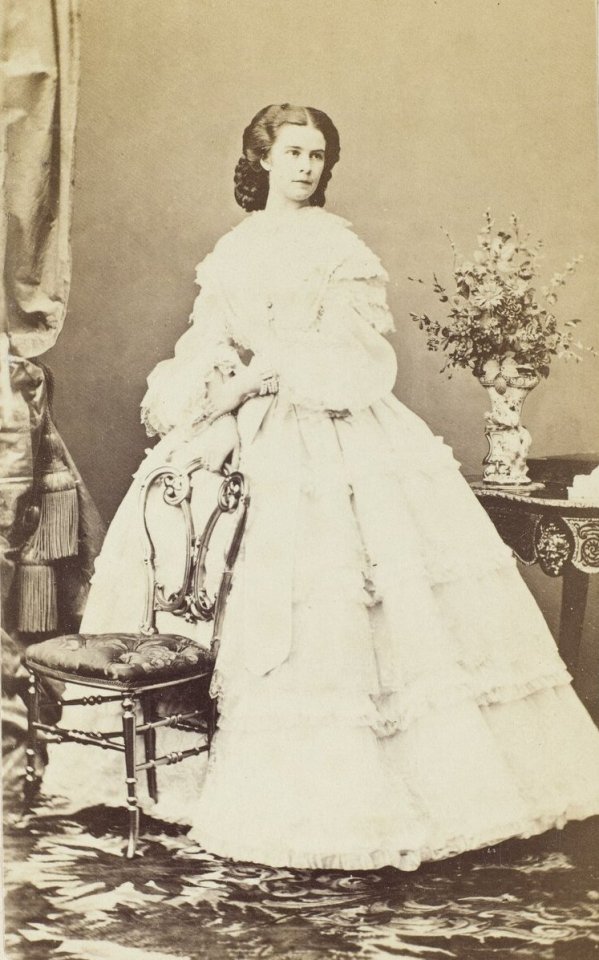
Left: Doctor Johann Seeburger, by Ludwig Angerer, c. 1860. Via the Royal Collection Trust. Right: Empress Elisabeth of Austria, by Ludwig Angerer, c. 1861. Via Wikimedia Commons.
I had this sitting on my drafts for months, yet I didn’t find any motivation to finish this post. That is, until the first teaser of Die Kaiserin season 2 dropped, featuring, among other things, a scene in which Elisabeth spits a doctor in the face. And while something as rude as this never happened, the young empress of Austria did have a troubled relationship with one doctor at the Habsburg court: Johann Seeburger. I don’t know if the doctor in the teaser is meant to be him, but given that he and Elisabeth ended up being borderline hostile towards each other, I wouldn’t be surprised if Seeburger was the inspiration (assuming the doctor is an actual character with lines and not a random physician that will get spit on the face for no reason). So without further ado, let’s look at what we know about Elisabeth and Seeburger’s relationship.
I couldn’t find information on Dr Johann Seeburger, only that he was born in 1800, and seems to have worked at court since at least the beginning of the reign of Franz Josef (probably earlier, since it was very difficult to access court). We don’t know what kind of relationship Elisabeth and Seeburger had when they met, as biographers don’t make any mention of it. He attended Elisabeth during her first pregnancy, and I think it’s safe to assume he also treated her during her second one. Seeburger wasn’t the only doctor consulted - Doctor Heinrich Fischer, the Wittelsbach’s personal physician, was also called for a second opinion.
Aunt Luise [Elisabeth’s mother]’s Doctor Fischer, in whom I have a great deal of confidence, has arrived here... [He was] delighted by Sisi’s blooming appearance and finds her whole condition very satisfactory. He and Seeburger say that the great moment will come at the end of February, at least the first days of March... (Praschl-Bichler, 2008)
Elisabeth probably felt more comfortable with Fischer, who had been her doctor back in Bavaria, than with Seeburger, so it’s not odd they called him for a second opinion.
It is not only until the Imperial family’s ill-fated Hungarian trip of 1857 that Sisi’s biographers mention Seeburger again - for in this trip, her first child tragically died.
The little archduchesses Sophie and Gisela arrived in Hungary on May 5 of 1857, a day after their parents, but they never joined them in the tour - the girls were to stay in Buda, where the Imperial couple could visit them during the short breaks of the packed tour schedule, which was meant to last two months. The visit started off well, but only a few days after their arrival, Gisela fell ill with fever.
Gisela’s fever was first attributed to teething, but the next day her sister Sophie also fell ill. Franz Josef and Sisi were meant to leave Buda and continue their journey through eastern Hungary, but the emperor postponed the journey for ten days as the girls continued to be sick. This did not mean that the parents were always next to their daughters, as historian Martina Winkelhofer notes, “the days that were now free were filled with further receptions and audiences. Only the evening festive events were cancelled.” (2022)
After three days Gisela got better, but Sophie showed no improvement. Dr Seeburger was among the physicians that were present attending the young archduchesses, but still Franz Josef called the pediatrician Josef-Michael Götz from Vienna. “The latter was not only the author of the manual Care and Treatment of Sick Children during the Early Phase of Life (1842), which is in the imperial court library, but had also studied the ‘course of the great epidemics (cholera, typhus, influenza) in children’.” (ibid, 2022)
Götz left a day after being summoned, but Baby Sophie only got worse. At this point the parents were feeling desperate: Franz Josef wrote to his mother Archduchess Sophie that the girl’s cries “tore his heart apart”, and added that “‘What Sisi and I are suffering, you can imagine!’” (Praschl-Bichler, 2008). Baby Sophie was diagnosed with typhus, and the pediatrician was recalled. After a hard night it seemed the child showed signs of being better, and it was believed she would recover. So on May 21, the Imperial couple was given the all-clear by the doctors to finally continue their tour.
Here is where things get a bit odd. Quoting Winkelhofer again (emphasis by me):
Elisabeth and Franz Joseph then set off from Buda to Jászberényi with a solemn entrance into the city. On the fourth day of the tour, however - as can be read in the travel protocol - there arrived “a telegraphic dispatch about the condition of Her Imperial Highness Archduchess Sophie from Buda, the contents of which distressed His Majesty to such an extent that Her Royal Highness’s departure was already scheduled for noon”. The telegram probably came from Sophie’s aja, and may have been sent without consulting the doctors because, as soon as the decision to leave was made, a report from the court physicians arrived: “His Majesty [had] decided to interrupt the sudden departure that had already begun”. (2022)
What happened? We can only speculate - whether the aya realized that Sophie hadn’t recovered before the doctors, whether the doctors’ report arrived before the girl’s health worsened. Whatever actually happened, those hours of delay were to result crucial: the next morning Sophie was in critical condition. The parents, who were in Debrecen at the moment, only arrived in Buda the following morning, where they found their child already at death’s door. That afternoon, on May 29, the two years-old Sophie died.
I went in detail on the last days of Baby Sophie because I think they’re crucial to understand the aftermath of her death. Having been away from her daughter during her final days was a great source of torment for Elisabeth, who blamed herself for leaving the child when they thought she was going to make it. Unsurprisingly, she also felt the physicians had failed in saving her daughter. According to her biographer Egon Conte Corti, the young empress tried to have Seeburger dismissed, but Archduchess Sophie’s intervention prevented it. (1936, p. 75)
I always feel that biographers focus too much on how grief made Elisabeth act “irrational” - to the point they ignore that she had a genuine reason to be upset at Dr Seeburger. Was she being fair? I don’t know, it was the 19th century, who knows if there was any doctor who could’ve cured Baby Sophie. I want to believe that all the doctors who treated her truly did as much as they could to help the girl. Corti claims that until the end Seeburger “was very crestfallen, but when pressed with questions he would only say that he had not given up hope.” (ibid, p. 73). But it was Seeburger and the medical staff who ultimately told Elisabeth and Franz Josef that it was safe to leave Sophie and continue the trip, and it was he who sent the report that prevented them from coming back earlier the 28th. Perhaps her animosity towards the doctor was unfair, but the way I see it, it was also understandable.
After this, the relationship between the empress and the court doctor became tense. Unlike her first two, Sisi’s third pregnancy and labor were very difficult. She wasn’t allowed to nurse Rudolf - which was the norm, but she had a large influx of milk that caused her a lot of pain. More concerning, she caught fever during the puerperium, but even though Laxemburg (where the Crown Prince had been born and the empress was recovering) was cooling, as it didn’t have heating, Seeburger didn’t order to move the empress to a different palace. Winkelhofer notes that the physician’s attitude is surprising, since there was a real danger of puerperal fever. Archduchess Sophie had to write (emphasis by me):
telegram after telegram to convince the Emperor and Seeburger that it was only the unhealthy air in Laxenburg that was causing Sisi’s fever attacks and that a speedy transfer of Sisi to my warm parlours in Schönbrunn [Sophie was staying in Ischl], well protected in a closed carriage during the warm midday hours, would certainly be advisable. Seeburger did not want to go along with this idea at first, but after the second attack of fever he said he would bring Sisi to Schönbrunn in the middle of this month; if only the bad weather did not throw a spanner in the works! (Praschl-Bichler, 2008; also in Winkelhofer, 2022)
Only months after Rudolf’s birth, Austria was at war with Sardinia. The war took a great toll on Sisi’s mental health, and she was visibly stressed. The court society found their empress disappointing: they wanted an icon of hope, a figurehead who would visit hospitals and attend public events to lift the spirits of the Viennese. But Elisabeth was only a twenty-years old woman who hadn’t known peace for the past years, and courtiers could not forgive her this. Dr Seeburger was no exception. During a meeting, the physician told the Viennese police officer that:
She [Elisabeth] is unfit for her position both as Empress and as wife; though she has really nothing to do. Her relations with the children are most perfunctory, and though she grieves and weeps over the noble Emperor’s absence, she goes out riding for hours on end, ruining her health. An icy gulf separates her from the Archduchess Sophie, and the Mistress of the Household, the Countess Esterhazy, has absolutely no influence over her. (Corti, 1936, p. 81)
If you’ve read any biography of Sisi, you’ve probably read this quote. Authors who cite this statement usually focus on what Seeburger said: Elisabeth was acting “crazy” during the war, she didn’t have a good relationship with her kids, she and her mother-in-law couldn’t stand each other anymore. His word is usually taken at face value, even if the author citing him notes that Seeburger and Sisi didn’t like each other much. Martina Winkelhofer is the only historian I’ve read who takes into account the context in which the court doctor said this, and considers what it meant (emphasis by me):
These strong words show how unfairly the emperor’s closest entourage behaved towards Elisabeth. Even if this was the court physician’s personal opinion, someone so close to the imperial family should not have expressed himself in this way. Details about members of the household were taboo and observing their silence was a sign of the loyalty necessary for a career at court. Seeburger could have written about his disappointment in the form of a diary, as many did, without publicly defaming the imperial couple. By revealing such intimacies to the police minister, who had a widespread network of informants and contacts in all parts of society, he damaged the emperor. In addition, Seeburger’s complaints contained a good deal of misogyny, because all he did was deny Elisabeth the right to be a woman, wife and mother, even out loud. (2022)
Seeburger’s statement about Elisabeth wasn’t a neutral observation: he was badmouthing her after years of having a bad relationship with her, something many authors don’t seem to realize when citing him. As Winkelhofer also notes, although Archduchess Sophie was indeed not getting along with her daughter-in-law at this time, she did not write nor say a bad thing about Elisabeth, because attacking the empress was the same as attacking the monarchy. Even if you think Seeburger was right, I don’t think you should omit the context in which he said what he said.
When Elisabeth fell mysteriously ill in 1861, she wasn’t attended by Seeburger. Many doctors treated the empress the following two years, but it was eventually her trusted family doctor, Heinrich Fischer, who was able to cure Sisi: when he finally took charge of her treatment in 1862, he concluded that she had been misdiagnosed by her previous doctors; most importantly, he seems to have noticed that her ailments weren’t only physical, but also mental. He remained her personal physician until his death in 1874. (Winkelhofer, 2022)
Elisabeth and Seeburger had a complicated relationship, to say the least. We are still missing a lot of information, but for what I could gather, the hostility between the two isn’t really surprising. What’s surprising is how this entire context is missing in so many books about the empress, especially when Seeburger’s famous quote is brought up.
Sources:
Corti, Egon Caesar Conte (1936). Elizabeth, empress of Austria (translation by Catherine Alison Phillips)
Praschl-Bichler (2008). Unsere liebe Sisi: Die Wahrheit über Erzherzogin Sophie und Kaiserin Elisabeth
Winkelhofer, Martina (2022). Sissi. La vera storia. Il cammino della giovane imperatrice (translation by Federica Saccucci)
#empress elisabeth of austria#doctor johann seeburger#archduchess sophie of austria#franz josef i of austria#sophie of bavaria archduchess of austria#tw death of a child
60 notes
·
View notes
Text

Joseph Karl Stieler (German, 1781–1858) Sophie, Archduchess of Austria (née Princess of Bavaria), 1832 Gallery of Beauties, Nymphenburg Palace
Sophie was the eldest daughter of King Maximilan I of Bavaria and his second wife, Princess Caroline of Baden. She was thus a half-sister to King Ludwig I. She was also the mother of the future Emperor Franz Joseph of Austria.
#Joseph Karl Stieler#german art#germany#german#1832#1800s#art#fine art#european art#classical art#europe#european#fine arts#oil painting#europa#archduchess#princess#bavaria#female portrait#female#woman#brunette#blue eyes
32 notes
·
View notes
Text
New Demigod Cabin: The Charites (Graces)



The Charites (Roman Gratiae-Graces) are a trio of goddesses of beauty, fun, happiness, and festivities. The elder Charites are daughters of Zeus and the Oceanid Eurynome, and are part of Aphrodite's retinue. The leader, Aglaia (glory, radiance), is also known as Charis (grace) and Cale/Calleis (beauty) and is the second wife of Hephaestus. She sometimes acts as Aphrodite's messenger. Her sisters are Thalia (abundance, banquets) and Euphrosyne (joy, cheer).
The Charites' demigod children have spread beauty and joy in the world throughout history, either through their own actions or by serving as inspiration for others. They are attractive and tend to have great artistic qualities. These qualities make them frequent companions of demigod children of the Muses, as well as Apollo and Aphrodite.
Historical Demigods/Legacies
Aglaia: Edith Tolkien, Queen Elisabeth I, Gloria Swanson
Euphrosyne: Beethoven, George W. Joy, Élisabeth Vigée Le Brun
Thalia: King Ludwig I of Bavaria, Lord Mayor Henry Picard, Clara Peeters Cabin Members: Gloria Marvel, Phil and Tre Goodman, Joy Gladstone, Letitia Merryweather, Isaac Shiraishi Head Counselor: Carissa Dolce
#pjo#pjo series#pjo fandom#pjo cabins#percy jackon and the olympians#percy jackson#camp half blood#pjo moodboard#pjo aesthetic#pjo fanfiction#percy jackson cabins#percy jackson fanfiction#percy jackson new cabins#Charites#aglaia#euphrosyne#thalia#gratiae
48 notes
·
View notes
Text

Portrait of Helene Sedlmayr
Artist: Joseph Karl Stieler (German, 1781–1858
Genre: Portrait
Date: 1831
Medium: Oil on Canvas
Collection: Nymphenburg Palace, Munich, Germany
Helene Sedlmayr
Helene Kreszenz Sedlmayr (12 February 1813, Trostberg – 18 November 1898, Munich) was a German beauty of the 19th century, considered the epitome of Munich's beauties. A shoemaker's daughter, she became known to Ludwig I of Bavaria when (aged 15) she supplied toys to his children and he commissioned a portrait of her from Stieler for his Gallery of Beauties and her portrait is one of the most famous of the 36 portrait paintings of the Beauties.
In 1831 she married the king's valet Hermes Miller (1804–1871), with whom she had 10 children.
#portrait#female#half length#oil on canvas#painting#german#girl#gallery of beauties#joseph karl stieler#german art#european culture#beautiful#aesthetic#19th century
17 notes
·
View notes
Text
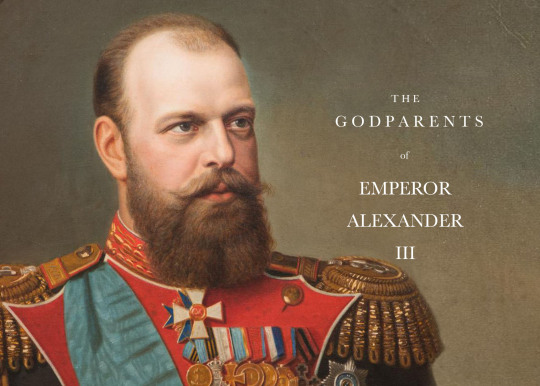

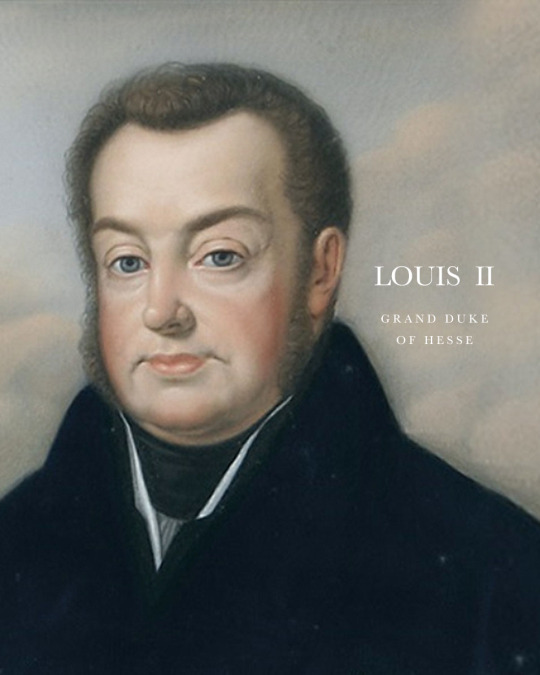

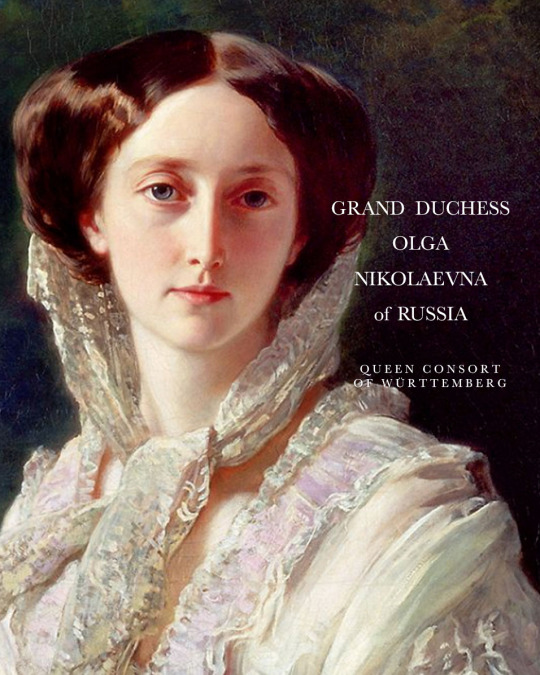
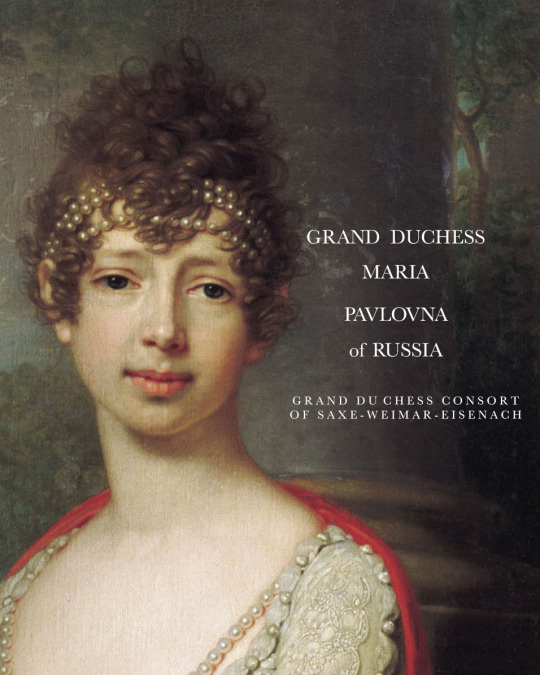

GODPARENTS OF EMPEROR ALEXANDER III
Emperor Alexander III (then Grand Duke) was born as the second son of Emperor Alexander II (then Tsesarevich) on 10 March 1845, during the reign of his grandfather Emperor Nicholas I. He was christened a week later at 10 am in the Winter Palace Church, St. Petersburg, by the Confessor of Their Imperial Highnesses. He had six listed godparents:
NICHOLAS I, EMPEROR OF RUSSIA - his paternal grandfather was one of his godparents present at his christening. Mainly remembered in history as a reactionary whose controversial reign was marked by geographical expansion, centralisation of administrative policies and repression of dissent. He died in 1855, when the Alexander was only 9 years-old, just a week shy from his 10th birthday.
LOUIS II, GRAND DUKE OF HESSE AND BY RHINE - his maternal grandfather was another of his godparents, but was absent at the christening. The hessian grand duke, like his paternal grandfather, was also considered a reactionary leader, he was in conflict with parliament almost his entire reign. The German revolution in 1848-49 proved his inability to govern. On March 5, 1848 he named his son Louis III as co-regent, and a year later he died.
GRAND DUCHESS ELENA PAVLOVNA OF RUSSIA - his great-aunt, the wife of Grand Duke Michael Pavlovich, stood as one of his godparents. Born as Princess Charlotte of Württemberg, she became a close friend of Alexander's mother the Empress Maria Alexandrovna, and was known as an intellectual. She was also considered the most exceptional woman in the imperial family since Catherine the Great.
GRAND DUCHESS OLGA NIKOLAEVNA OF RUSSIA, QUEEN CONSORT OF WÜRTTEMBERG - his aunt was one of his godparents present at the christening. She was the younger sister of his father. Attractive, cultured and intelligent, she was considered to be one of the most eligible princesses in Europe. Just three years after her nephew was born, in 1846, she married Crown Prince Karl of Württemberg. Alexander's older brother the heir apparent Nicholas died just two months before their aunt Queen consort of Württemberg. With his death, he became the next heir apparent, the 'Tsesarevich'.
GRAND DUCHESS MARIA PAVLOVNA OF RUSSIA, GRAND DUCHESS CONSORT OF SAXE-WEIMAR-EISENACH - his great-aunt was another of his godparents. One of the daughters of Emperor Paul I, the grand duchess married a German prince Karl Friedrich, Grand Duke of Saxe-Weimar-Eisenach in 1804. She was an intellect, interested in both arts and sciences. German poet and novelist Johann Wolfgang von Goethe hailed her as one of the worthiest women of his time. She was the great-grandmother of Wilhelm II, German Emperor and Queen Victoria of Sweden.
PRINCESS MATHILDE CAROLINE OF BAVARIA, GRAND DUCHESS OF HESSE AND BY RHINE - his aunt, the wife of his uncle Louis III, Grand Duke of Hesse and by Rhine, was listed as one of the future emperor's godparents. She was the eldest daughter of King Ludwig I of Bavaria. Her marriage to Louis III was childless. She died of cancer in 1862 at the age of 48.
Source
35 notes
·
View notes
Text
"The Waste Land" by T. S. Eliot, page 4
Every week on this site, I will be publishing a new page from my ongoing comics adaptation of “The Burial of the Dead,” the first section of T. S. Eliot’s epochal poem “The Waste Land.” (The main references in this section are to the reminiscences of Countess Marie Larisch, illegitimate daughter of Duke Ludwig Wilhelm in Bavaria. Her cousin is Crown Prince Rudolf of Austria, who later took his…
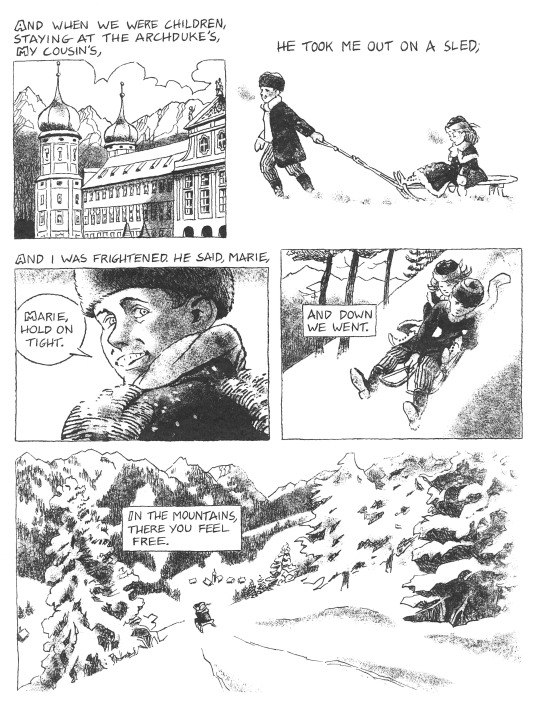
View On WordPress
#crown prince rudolf#marie larisch#mayerling incident#poetry#poetry comics#sledding#T. S. Eliot#the burial of the dead#the waste land
7 notes
·
View notes
Note
Hi,
In my country, I haven't been able to watch season 4 of sisi 2021 yet. I really do want to know what's happening so could you give a summary(with spoilers) of what's happening during the season? Is there any infidelity or like is the storyline hinting at it?
Spoilers below.
I'll try to make this as short as possible while also ideally covering everything.
Sisi is traveling and has a riding accident which makes her fall into a coma for quite some time and she only barely escapes being paralized. Meanwhile her father Max suffers a heart attack and dies soon after.
Sisi misses her father's funeral because Franz decided not to tell her while she is recovering. It puts a strain on their relationship as Sisi couldn't say goodbye to her dad.
At Possenhofen, we learn that Max actually gambled away the castle to the jockey Georg Basselet whose family previously owned the estate. Sisi is determined to save her family home and demands a horse race. He eventually agrees. However, Franz has asked her not to ride again. He soon has to leave for Vienna while she decides to stay behind "to recover".
The horse keeper at Possenhofen is actually Sisi's half-sister Linda because surprise, surprise Max has had an affair since at least the beginning of his marriage to Ludovika. Linda is the only one who can handle the fastest horse in the stable but Ludovika actually fired her after Max's death. Sisi gets her back but then she accused of murdering her mother Adele. She didn't. It looks like Ludovika did it but she also didn't and instead Adele had commited suicide. Ludovika tried to hide this whole thing because she swapped babies with Adele, helped by Archduchess Sophie, after her Louis had died in childbed. She promised Adele to love Louis like her own child (she did) but after Max's death Adele's suicide note would have revealed the truth. It's all nicely cleaned up by pulling rank.
Sisi has a love-hate relationship with Georg Basselet. They have chemistry and they dance but he dislikes the nobility. Anyway they tease each other all the time. It's a bit will they, won't they. Surprisingly, they neither kiss nor fuck.
Franz eventually gets to know about Sisi lying to him and orders her back to Vienna. Ludovika told on Sisi because Sisi was snooping around and close to figuring out what her mother was hiding. Grünne is the one doing the dirty work here by investigating everything for Sisi. For the Grünne fan out there: No, he has no interaction with Franz. Their relationship remains broken.
Sisi eventually gets back to Bavaria. Does the race, wins while Franz secretly watches. He realized he can't cage her, she realized he is her home but she will never be able to stay long in Vienna because she hates court. Kiss and end.
The side plots are about Sisi's siblings Louis and Sophie Charlotte (they always call her by both names which gets annoying real fast). Louis is in love with actress Henriette Mendel and actually engaged, he just doesn't know how to tell his mother. They break up for a bit and then decide to be secret lovers because Louis is supposed to marry one of his cousin King Ludwig II's minister's daughter, so he himself can become justice secretary. He eventually realizes he loves Henriette more than his dream and gives it up to be with her. Louis basically mirrors his father's story but ultimately chooses love.
Sophie is basically Max's female clone. She is rebellious, quick-witted, entitled and bold. Ludovika wants her married. Her act of rebellion is choosing Ludwig. The family is horrified but eventually has not choice but to go along as Ludwig also shows interest in her and kisses her in public, only to then drop her like a hot potato. She confronts him. Yada yada yada. Eventually she agrees to meet some other dude and quite likes him. However, it is not the Duke the historical Sophie marries.
I think that's mostly it. It's kinda left open in a way that RTL could develop a spin-off focussing on Louis, Ludwig and Sophie Charlotte, if they wanted to. I don't think they are doing this but they absolutely could.
2 notes
·
View notes
Text
An artist has to pay for the gift of his genius. Wagner paid. He was defeated, one way or another, all his life. His own self-destructiveness always pursued him. There wasn’t one of his triumphs that was not spoiled, at the moment of triumph, by his own self-destructiveness. But what he couldn’t do, his characters do. In his operas, he splits his many-faceted self into those characters. He drains off the evil in himself and, as the long dramas move towards their great catharses, he brings the good together. Hans Sachs does what Wagner wanted to do but never could – renounce his own wilfulness and open up in understanding and compassion to others.
M. Owen Lee, Wagner and the Wonder of Art: An Introduction to Die Meistersinger
Of Wagner’s great operas, “Die Meistersinger von Nürnberg” often gets overlooked when the conversation of “greatest works” begins. Perhaps partly because the story is pretty straightforward and is also admittedly one of the composer’s more intimate operas. The opera opens on Midsummer's eve, Nuremberg in the 16th century - a setting many productions have played loose with for example I went to one of Glyndebourne's production that updated the setting to the early 19th century.
The story revolves around the real-life cobbler-poet Hans Sachs and the guild of mastersingers - poets and musicians who pursue their craft according to traditions and rules. A goldsmith's daughter, Eva, and a knight, Walther von Stolzing, fall in love, but Eva's father has promised her to the winner in the forthcoming song contest. Walther must learn the mastersinger's art rapidly, under the wise tuition of Sachs (considered Wagner's most generous and human character) - and despite a challenge from the foolish town clerk Beckmesser.

The premiere of Richard Wagner’s Die Meistersinger von Nürnberg was generously supported by Ludwig II of Bavaria, at the Munich Court Opera on 21 June 1868. Hans von Bülow conducted, and Franz Strauss, the father of Richard Strauss played the French horn at the premiere. It was enthusiastically received, and Eduard Hanslick wrote in Die Neue Freie Presse, “Dazzling scenes of colour and splendour, ensembles full of life and character unfold before the spectator’s eyes, hardly allowing him the leisure to weigh how much and how little of these effects is of musical origin.”
Within a year of its premiere, Meistersinger was performed across central Europe, and Hans Sachs’s final warning at the end of Act III for the need to preserve German art from foreign threats became a rallying point for German nationalism, particularly during the Franco-Prussian War, the Wilhelmine Reich, the Weimar Republic, and most notoriously, during the Third Reich. But - and quite rightly so - many contemporary productions have attempted to redeem it as one of Wagner's most approachable, tuneful and likeable works.
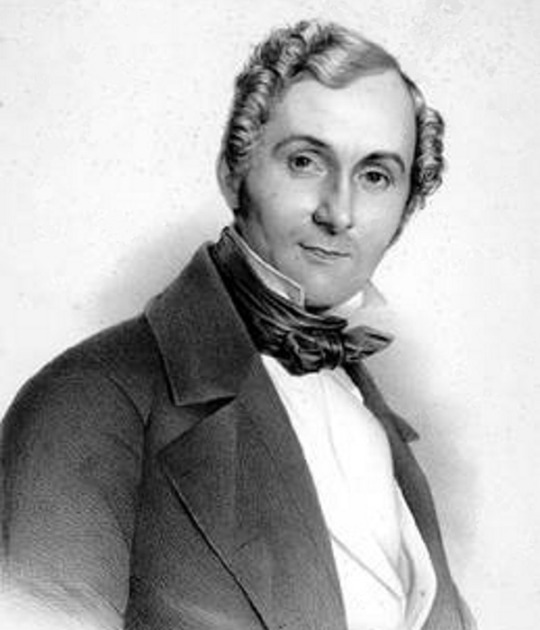
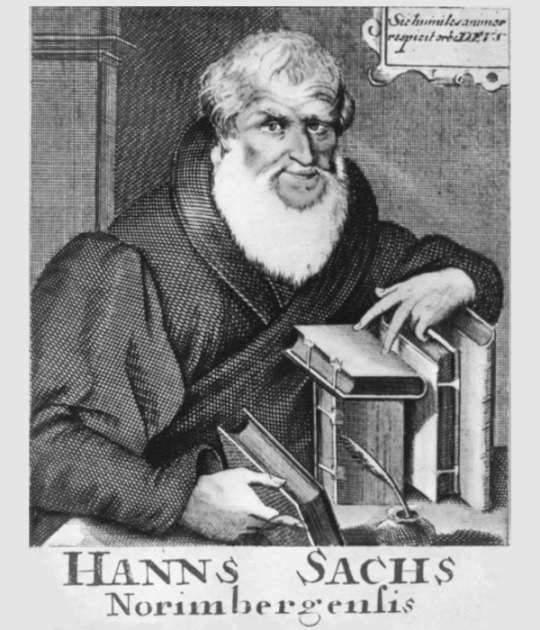
The opera itself was not based on any major myth the way some of his other works were and its tame and comic nature make it seem ripe to overlook in the context of his other massive philosophical works. Yet this opera is every bit as good, if not better, than many of Wagner’s best works. It’s overture has become a staple of the standard orchestral repertoire, but its themes of longing and the nature of art and its purpose are among the most immersive and potent discussions that the creator engages his audience in. The main draw I think is the character of Hans Sachs himself that Wagner himself readily identified with.
As a 15-year-old Wagner saw Deinhardstein’s comedy “Hans Sachs” on a Dresden stage, which captivated him instantly. It was about the Nuremberg poet and Meistersinger Sachs, who was known for his poetry in the 16th century. The art of the Mastersingers went back to minstrels who made music according to free rules and who recorded their art rules in fixed tablatures as they gradually settled in the cities. This art was subsequently administered by the guild masters, of whom the shoemaker Sachs was the most famous.
17 years after his experience in the Dresden theatre, Wagner felt the need to create a cheerful counterpart to the tragic “Tannhäuser”. He recollected the comedy and created his first sketches in 1845 during a spa stay in Marienbad. His involvement in the Dresden Revolution and the hectic flight to Switzerland interrupted the work and it was to take another 15 years before he resumed work.
Why it took him so long to write could partly be explained by financial woes which despite taking a heavy advance he failed to turn in a credible draft. It was not until the work on the opera continued when Ludwig II of Bavaria relieved him of his financial needs and he was able to complete the work by 1867. But also he needed time for ideas to marinate as it was only later that Wagner had come across a chronicle by Wagenseil (“von den Meisters Singer holdseligen Kunst”), which gave him a comprehensive insight into the rules and regulations of the Meistersinger.
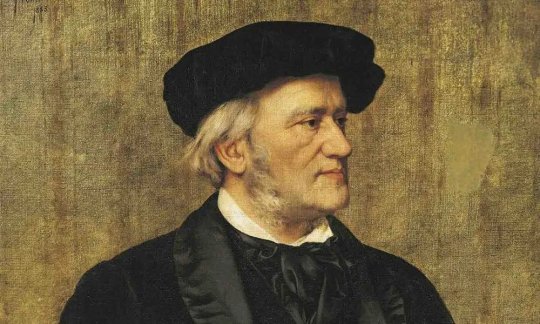
But yet another reason exists which was the emotional turbulence in his life, in particular his relationship with his then secret lover, Mathilde Wesendonck. At the invitation of his Zurich patrons, the Wesendonck couple, Wagner spent a few days with them in Venice in 1861. There he discovered that his secret lover Mathilde Wesendonck was pregnant with her husband’s fifth child. After the love affair was already in a crisis, Wagner realised that this love, which inspired him to “Tristan and Isolde” was over. Now Wagner decided to philosophically transcend this indirect “rejection” and saw himself as Hans Sachs, who renounced love for noble reasons.
The philosophical framework for this was provided by Schopenhauer’s work “Die Welt als Wille und Vorstellung” (The World as Will and representation”), which he had become acquainted with a few years earlier. In Schopenhauer’s pessimistic view of the world, the will of the predator “man” results in destructive torments. This inherent mania leads to war, self-destruction and loss of love, whose only way out is renunciation (of the will).
Thus the shoemaker poet Hans Sachs became a Schopenhauer figure whose world philosophy Wagner expounded in the delusional monologue of the third act. This philosophical change explains the paramount importance of Hans Sachs’ figure in Wagner’s Meistersinger: Sachs is the master himself. Wagner identified himself with no other figure more than the cobbler-poet, and he has him quoted in the third act “Tristan and Isolde”: «Mein Kind, von Tristan und Isolde kenn’ ich ein traurig Stück. Hans Sachs war klug und wollte nichts von Herrn Markes Glück». (“My child, I know a sad tale of Tristan and Isolde. Hans Sachs was clever and did not want anything of King Marke’s lot”). Isolde now became Eva!

Apart from Sachs, all other figures fade away, even the revolutionary hero and iconoclast Walther (who also has a little Wagner in him) must take a back seat to the light figure Sachs. If the Junker Walther were the hero of the final act in a “normal” opera, the third act now becomes the two-hour “Hans Sachs Festival”, which begins with his Wahn-monologue and ends with his «Verachtet mir die Meister nicht» (“Don’t despise me the masters”), forming one of the most gigantic par force tours in all of opera literature. The part of Sachs demands the whole range of the singer’s repertoire: high lyrical passages, long declamatory stretches and of course the high passages of the third act and the enormous final scene.
Marco Jentzsc sings a snippet of Walther's prize song in David McVicar's 2011 production.
#owen lee#lee#quote#richard wagner#wagner#classical music#music#opera#arts#culture#beauty#aesthetics#hans sachs#meistersinger von nurnberg#schopenauer#philosophy#muse#composer#icon
27 notes
·
View notes
Note
Who are your favorite historical figures?
the borgias siblings: cesare, lucrezia and juan borgia
emma of normandy
caterina sforza
king ludwig ii of bavaria and his brother prince otto of bavaria.
robert, guildford and amy dudley
empress elisabeth of austria and her sister princess sophie
anne boleyn and her daughter elizabeth i
niccolò machiavelli
mary stuart queen of scots
5 notes
·
View notes
Text
Princess Adelgunde of Bavaria (German: Adelgunde Auguste Charlotte Caroline Elisabeth Amalie Marie Sophie Luise von Bayern; 19 March 1823 – 28 October 1914) was a daughter of Ludwig I of Bavaria and Therese of Saxe-Hildburghausen.
Why’d they give this poor girl 8 middle names
5 notes
·
View notes
Text
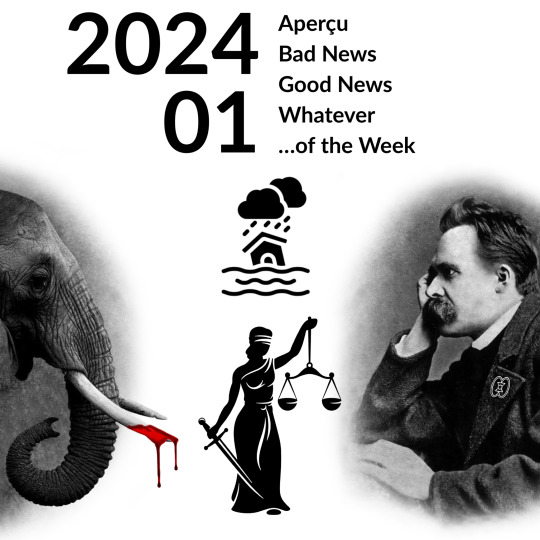
2024 / 01
Aperçu of the Week:
"He who breaks a resolution is a weakling. He who makes one is a fool."
(Frederic Lawrence Knowles, US-American poet from the 19th century)
Bad News of the Week:
Flooding in Central Europe. Extreme continuous rain has caused a variety of dangers in Germany and France. The consequences of simply too much water in too short a time range from overflowing river beds to washed-out roads and burst dams. In Lower Saxony alone, 10,000 helpers from the fire department, technical relief organizations and even the military are working to prevent the worst.
Nowhere did the rain fall as snow because it was simply too warm: in the course of last week it was plus 12 degrees Celsius in southern Bavaria - and that at the beginning of January. In the new week, however, we have 12 degrees below zero. The experts disagree as to whether the frost is beneficial to the stability of the softened dykes or not. And if we humans are already having problems coping with the change in temperature with all our resources, what must it feel like for nature?
Sweden, for example, is experiencing record sub-zero temperatures. This is pushing fauna and flora to their limits. I dare not even imagine that this will once again be used as an argument by people wearing aluminum hats that there is no global warming.
Good News of the Week:
For a change, there is some good news from Israel. No, Benjamin Netanyahu has not resigned. Even if he in particular will see this as bad news: Israel's supreme court has declared a core element of the so-called "judicial reform" illegal. As a reminder, the far-right executive has been engaged in a trial of strength with the judiciary for a year now. In principle, the government's aim is to disempower the judiciary, for Netanyahu also out of personal self-protection against prosecution. Hundreds of thousands took to the streets against this for months. Then stopped not by sensible government action, but by the Hamas attack on October 7 last year.
But the Supreme Court still has its powers. And it uses them. By rejecting an amendment to the law that would have prevented it from taking action against "inappropriate" decisions by the government, the prime minister or individual ministers. Critics had already warned that this amendment could encourage corruption and arbitrary appointments to important posts, among other things - in other words: it was simply undemocratic.
This is an important victory on points. However, it remains to be seen what effect the decision will have on the government's other so-called "reform projects", all of which are directed against an independent, strong judiciary. But have been on hold since the Hamas attack. Evil voices say that Netanyahu's creeping loss of authority is also on hold only because of the Gaza war. After all, no nation likes to change its government in times of crisis. All the more reason to hope for an early end to the conflict.
Personal happy moment of the week:
Saturday was Epiphany. A holiday on which children in rural Bavaria dress up as the three holy kings and carol singers and go from house to house. And bless the house for the new year. A collection is made for a good cause: a children's home in Puerto Rico. A touch of normality and hope for 2024.
I couldn't care less...
...about royal news. Even if, as a Bavarian, I recognize their historical significance (Ludwig II, Sissi, etc.), I think they are simply outdated these days. Even if my daughter, in her current student job, is trying to keep the Wittelsbachs alive on social media. In this respect, I welcome the fact that Queen Margrethe II of Denmark announced her abdication at the end of the week. Unfortunately, she is not abolishing the monarchy at the same time, but handing over to her son. Sidenote: British King Charles III is still the official head of state of Canada. Ridiculous.
It's fine with me...
...that my favorite newspaper (which I rarely get to read in detail) "Die Zeit" is headlined this week: How does peace work, Immanuel Kant? I think it's extremely valuable that journalism doesn't limit itself to daily news tickers, but instead asks questions, looks behind the scenes and thinks about things. It is not for nothing that in democracies it is called the "fourth power in the state" alongside the legislative, executive and judicial branches. Bravo!
As I write this...
...I discover the music of Keith Jarrett. The exceptional pianist has not only excelled in remarkable recordings of classical music (especially Johann Sebastian Bach), but above all with jazz. I would have loved to experience one of his concert evenings with only improvisations (!) live. I don't know many musicians whose performance makes you realize how much fun they are having doing music. It's also charming that you can hear Jarrett humming along from time to time, or even beatboxing. My favorite albums are the ones he recorded with bassist Charlie Haden. Thanks to excellent headphones with noise canceling, they provide a relaxed oasis of quiet ("piano") music enjoyment even after a long working day on a packed commuter train.
Post Scriptum
My "symbolic thinker" for 2024 - after Goethe, Cicero, Freud and Aristotle in recent years - is Friedrich Nietzsche. Who stares at the elephant in the room. Fascinated? Disgusted? Surprised? In any case, observant, analytical and critical. And an allegory that I am really proud of. In the 19th century, the classical philologist and philosopher broke the mold with both his thinking and his style and did not allow himself to be assigned to any classical discipline - but created new ones, of which my wife understands more than I do due to her interest and a corresponding university degree. In the first semester, Nietzsche wears the ancient Greek symbol for democracy on his lapel. And the elephant has blood dripping from its tusk. Perhaps it is no coincidence that it is the heraldic animal of the US Republicans. But let's hope for the best...
#new years resolution#flooding#germany#france#sweden#bavaria#water#global warming#israel#supreme court#hamas#gaza#benjamin netanyahu#epiphany#royalty#charles iii#newspaper#die zeit#keith jarrett#piano#jazz#friedrich nietzsche#elephant#philosophy#republicans#symbolic#thinker#charlie haden#journalism#margrethe ii
1 note
·
View note
Text


Duchess Ludovika in Bavaria to her sister Archduchess Sophie of Austria, on the possible engagement of Archduke Karl Ludwig to Princess Maria Annunziata of Bourbon-Two Sicilies:
August 22, 1861 (...) My Marie [Queen of the Two Sicilies] wrote to me the other day that it was her husband [Francesco II]'s wish that his eldest sister [Maria Annunziata] could become your Karl [Ludwig]'s wife. Perhaps I should have expressed it in a much more fanciful way, but I didn't quite know how, so I fell through the door. I will now copy to you what Marie says of this sister-in-law: “Certainly Karl can find no better wife, and Aunt Sophie no better daughter-in-law. She is so shy and so learned, has such a noble, open character, such a lively spirit and so much resource, and at the same time such calm, gentle manners, just as I would wish for a wife for Gackel [Karl Theodor, Marie's brother] and a daughter-in-law for you; this must be proof for Aunt Sophie and Karl of how excellent the girl is. Although Petita [Princess Maria Immacolata, Annunziata's younger sister] is much prettier, everyone prefers Ciolla [Annunziata's nickname] because of her character, which is imprinted on her face, which is also pretty and has something so engaging and warm. I hope you will succeed in winning Aunt Sophie over to this idea; I would be indescribably happy, because I love the girl so much! I expect a good answer from you, with indescribable impatience”
Pictured: Princess Maria Annunziata and Archduke Karl Ludwig, by Oscar Kramer, circa 1862 (left). Queen Marie Sophie of the Two Sicilies, unknown, circa 1860 (right). Via ÖNB.
#matchmaker marie!#also this is from#sexau's pdf#queen marie sophie of the two sicilies#maria annunziata of bourbon-two sicilies archduchess of austria#archduke karl ludwig of austria#ludovika of bavaria duchess in bavaria#sophie of bavaria archduchess of austria
33 notes
·
View notes
Text










208 years ago today was born HM Vasilias Othon I of Greece Prince of Bavaria, (June 1, 1815 - July 26, 1867) was a Bavarian prince of the House of Wittelsbach, first king of the Greek state. He was the only monarch of Greece who brought the title of King of Greece, since the next ones, of the House of Glücksburg, had the title of King of the Greeks.
Othon Frederick Louis was born on June 1, 1815 at the Mirabell Palace in Salzburg. He was the second son of the Philhellenic King of Bavaria Ludwig I and Theresia, daughter of Frederick, Duke of Saxe-Altenburg. He was educated as a prince, destined for a secondary position within the state. In fact, his father wanted him to follow an ecclesiastical career and assigned his studies to the fanatical Catholic priest, Eitel, who later became the Bishop of Eichstedt
Because Othon was a minor, a Regency committee was formed. This organ consisted of
* Count Joseph Ludwig Armansberg - President
* Georg Ludwig von Maurer
* Major General Carl Wilhelm von Heideck
Some historians say that Othon loved Greece more than anything else, but not the Greeks. He died on July 26, 1867 in Bamberg. He himself wanted to be buried in the traditional clothing of Greece, the foustanella. He is buried next to Amalia, in the crypt of the family tombs of the Bavarian dynasty, in the Church of the Theatines, in the center of Munich.
Πριν 208 χρόνια σαν σήμερα γεννήθηκε Η ΑΜ Βασιλιας Όθων Α΄ της Ελλάδας Πρίγκιπας της Βαυαρίας ,( 1 Ιουνίου 1815 - 26 Ιουλίου 1867) ήταν Βαυαρός πρίγκιπας του Οίκου των Βίττελσμπαχ, πρώτος βασιλιάς του ελληνικού κράτους.Ήταν ο μοναδικός μονάρχης της Ελλάδος που έφερε τον τίτλο Βασιλεύς της Ελλάδος, δεδομένου ότι οι επόμενοι, του Οίκου των Γκλύξμπουργκ, είχαν τον τίτλο Βασιλεύς των Ελλήνων.
Ο Όθων Φρειδερίκος Λουδοβίκος γεννήθηκε την 1η Ιουνίου 1815 στο Παλάτι Μιραμπέλ του Σάλτσμπουργκ. Ήταν ο δευτερότοκος γιος του φιλέλληνα βασιλιά της Βαυαρίας Λουδοβίκου Α΄ και της Θηρεσίας, κόρης του Φρειδερίκου, Δούκα της Σαξονίας-Αλτεμβούργου. Έλαβε εκπαίδευση πρίγκηπα, που προοριζόταν για δευτερεύουσα θέση μέσα στο κράτος. Μάλιστα, ο πατέρας του ήθελε να ακολουθήσει εκκλησιαστική σταδιοδρομία και ανέθεσε τις σπουδές του στο φανατικό καθολικό ιερέα, Αίτελ, που αργότερα έγινε Επίσκοπος του Άιχστετ
Επειδή ο Όθων ήταν ανήλικος, σχηματίστηκε επιτροπή Αντιβασιλείας. Το όργανο αυτό αποτελούσαν οι
* Κόμης Γιόζεφ Λούντβιγκ Άρμανσπεργκ - Πρόεδρος
* Γκέοργκ Λούντβιγκ φον Μάουρερ
* Υποστράτηγος Καρλ Βίλχελμ φον Χάιντεκ
Κάποιοι ιστορικοί αναφέρουν ότι ο Όθων αγάπησε την Ελλάδα όσο τίποτε άλλο, όχι όμως και τους Έλληνες. Απεβίωσε στις 26 Ιουλίου 1867 στη Βαμβέργη. Ο ίδιος θέλησε να θαφτεί με την παραδοσιακή ενδυμασία της Ελλάδας, τη φουστανέλα. Είναι θαμμένος δίπλα στην Αμαλία, στην κρύπτη των οικογενειακών τάφων της βαυαρικής δυναστείας, στην Εκκλησία των Θεατινών, στο κέντρο του Μονάχου.
#kingconstantine#danishroyalfamily#crownprincepavlos#queenannemarie#greek royal family#house of romanov#greekroyals#crownprincessmariechantal#danishroyals#princeconstantinealexios
1 note
·
View note
Text
thanks for the tag this is so fun and dire bc im actually jared 19
Last book I read: Hamlet by William Shakespeare ((I think?? trying to go off my last theatre class here))
Book I recommend: I think everyone's read it but if they haven't The Great Gatsby by F Scott. Fitzgerald.
Book I couldn't put down: Oh baby, executive dysfunction has made me put every book down..... K Blows Top: A Cold War Comic Interlude, Starring Nikita Khrushchev, America's Most Unlikely Tourist by Peter Carlson took me the shortest amount of time ((4 months??)) to finish recently.
A book on my TBR: Mad King: The Life and Times of Ludwig II of Bavaria by Greg King bc he wrote another historical biography that I really, really liked about a similarly misunderstood person ((with Sue Woolmans)) ((hehe)) and I trust him to handle my dear lad with grace, but because my attention span is a bitch I never got past the first 40 pages but I WILL. one day.,,,,,,,,
A book I've put down: HITLER AND THE HABSBURGS BY JAMES LONGO!!1! Sorry not sorry but SOD that son of a cunt NO footnotes so half the things he said could've been made up for all I care bUT THE LAST STRAW was him PERVING OVER poor sophie von hohenberg when she was ON HER WAY TO CONFRONT THE NAZIS like piss offfffffff
A book on my wishlist: BBC Ghosts Button House Archives *finger guns* ooh and 'Allo 'Allo!: The War Diaries of Rene Artois
A favourite book from childhood: I don't remember a favourite bc I was actually a voracious reader once upon a time so I tore through them like it was nothing but The Tale of Despereaux by Kate DiCamillo destroyed me even if I am now morally opposed to the fundamental idea framing the narrative that rats arent cute little besties
A book you would give to a friend: Harry Clarke: An Imaginative Genius in Illustrations and Stained-Glass Arts by Hiroshi Umino bc I LOVE Harry Clarke's work and I think everyone should have a nice book full of pretty pictures to look at. It's also technically on my wishlist as well
A book of poetry/lyrics you own: I don't "own" any "books" bc im flat broke but a favourite would be that compilation of Oscar Wilde's nonsense quotations. I know he did real poetry but that's poetry in itself to me.
A non-fiction book you own: Stalin's Daughter: The Extraordinary and Tumultuous Life of Svetlana Alliluyeva by Rosemary Sullivan :)))))) this i actually DO own!1!
Currently reading: *sweats nervously in executive dysfunction*
Planning on reading next: Florian: The Emperor's Stallion by Felix Saltern bc it's got my meow meow in it and it's a kids book and I want to practice focusing enough to read like a normal human person again
tagging @pqnnier @alliluyevas whom I know for sure have read a lot and anyone who wants to do it bc idk whos a reader and who isnt!
Thanks for the tag, @enlitment!
Last book I read: The Scarlet Pimpernel by Baroness Orczy. Charming!
Book I recommend: Impossible question. Show me your soul and then ask me again.
Book I couldn't put down: Piranesi by Susanna Clarke. Grabbed me by the throat and would not let go. Sublime.
A book on my TBR: Vicious and Immoral by John Gilbert McCurdy is right up there; it looks fascinating and relevant to my research.
A book I've put down: The Goldfinch by Donna Tartt. Surprising that I got as far as I did (the first 120 or so pages), since that could all have been covered in a two-page prologue.
A book on my wishlist: At some point I also need to drop €60 (🥲) on André Weibel's »Einen Spiegel hast gefunden, der in allem Dich reflectirt«.
A book on my wishlist: The Hobbit by JRR Tolkien. Unquestioned reigning champion of being read approx one million times.
A book you would give to a friend: Anything by David Mitchell or Scarlett Thomas, depending on the friend.
A book of poetry/lyrics you own: The Loeb Greek Lyric: Anacreon, Anacreontea & Early Choral Lyric. Bangers on every page. Very gay.
A non-fiction book you own: Tom Cutterham's Gentlemen Revolutionaries is well worth a read for anyone interested in late 18th century masculinity and culture.
Currently reading: Temeraire by Naomi Novik. An old favourite that I'm discovering brand new joy in.
Planning on reading next: I have almost no time for fiction in between academic reading and writing and work, but These Violent Delights by Micah Nemerever has been waiting very patiently on my nightstand.
Tagging @permanenthistorydamage @iron--and--blood @nordleuchten @ouiouixmonami @clove-pinks and you!
#not to make excuses for it but i genuinely think my neurodivergence killed my reading capabilities#like my executive dysfunction and attention span fell to the pits once i reached teenagehood and now its just. So So Bad#i would love to read more but its so difficult!! i take like 4 hours to read 6 pages for classes and over 12 hours for a single reading#i am hoping to find it in me to try again tho! i have tried at the start of uni and i ought to try again!
28 notes
·
View notes
Text

Portrait of Cornelia Vetterlein
Artist: Joseph Karl Stieler (German, 1781–1858)
Date: 1828
Medium: Oil on Canvas
Collection: Nymphenburg Palace, Munich, Germany
Antonietta Cornelia Vetterlein
Antonietta Cornelia Vetterlein, Baroness von Künsberg (25 December 1812, Münchberg – 5 March 1862, Mainleus), was a Bavarian beauty of the 19th century. She was the granddaughter of Bayreuth Court Gardner Schneider and the daughter of State Councillor Vetterlein. She appeared in the Gallery of Beauties gathered by Ludwig I of Bavaria in 1828.
In 1826, she attended the Royal Court Heigel as a student and attracted the attention of King Ludwig I of Bavaria. In 1828, the king commissioned the court painter Joseph Karl Stieler to paint her for his Gallery of Beauties collection in Nymphenburg Palace, Munich.
Most of the paintings in the Gallery of Beauties did not have significant backgrounds, but Cornelia symbolizes constancy and a castle is shown in the background. To match the castle, she is portrayed as the traditional German Lady of the Castle. The painting was completed in the same year when Cornelia was just 16 years old.
#portrait#oil on canvas#german#female#gallery of beauties#joseph karl stieler#german painter#german culture#beauty#costume#jewelry#flower#landscape
7 notes
·
View notes
Photo

Mathilde Caroline of Bavaria, Grand Duchess of Hesse and by Rhine (30 August 1813 - 25 May 1862)
#mathilde caroline of bavaria#mathilde karoline friederike wilhelmine charlotte#grand duchess of hesse and by rhine#daughter of ludwig i of bavaria#wife of louis iii grand duke of hesse#history#women in history#19th century#art
12 notes
·
View notes